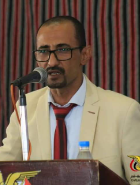Mohammad Noaman Al-Hakimi Quotes
On Bilquis Basil by Poet Mohammad Noaman Al-Hakimi W. B. Yeats, the famous Anglo-Irish poet, is reported to have said that if you quarrel with the world, you do politics, but if you quarrel with yourself, you write poetry. Al-Hakimi has not quarrelled with the world, to the best of my knowledge, i.e. not quarrelled publicly or violently; at any rate, there is no record of his quarrel with himself. He seems to be very much at peace with himself and with his world. Nevertheless, he is a poet, in spite of Yeats' obiter dictum. Just to show, perhaps, that every poet worth his name is a law unto himself. And this of course, empowers him to have ' Lovers Quarrel' with the world, now and then, that no sooner starts than is mended. Al-Hakimi is a poet of faith: faith in his God, faith in the land of his ancestors, its rugged stern-faced mountain ranges and deep reverence for Bilquis and her Basil. But he is at the same time aware that poems are not written with the faith however profound or principles however powerful. Poems are written with language its sounds, its words and phrases and its coded meanings. Naturally and intuitively, Al-Hakimi loves the sound patterns of his language, its consonantal alliteration, vocalic assonances, its mellifluous rhyme-sequences and its inimitable semantic patterns. This is what gives body to his faiths and ideas; this interanimation between his faiths and his loves constitutes his individual, unique contribution to the contemporary Arabic poetry.Al-Hakimi's poems are self-contained, richly meaningful structures of his feelings and emotions expressed through appropriate linguistic forms, gifts of his language Dr. K. M. Tiwary Taiz University 1997
Author Larry Frolick's writing on poems by poet Mohammad Noaman Al-Hakimi Taiz is a mountain-city in southern Yemen, and like all great southern cities the world over, it is romantic, lush, and accountable only to God and His Poets. • Mohammad Noaman al-Hakimi is a poet (born 1974) in Taiz, Yemen. These poems are freely translated from the original Arabic - AlHakimi's work relies on sonority and internal music as much as on colorful allusion and personal narrative - as befits the tradition of live recital in the diwa, the cushioned anteroom where Yemenis take their daily ease. • Larry Frolick is award-winning writer.He is the author of Ten Thousand Scorpions (2002) , about the persistence of the Queen of Sheba myth in Yemen, Ethiopia, and Turkey. He is the author of three books of literary journalism, including Grand Centaur Station: Unruly Living with the New Nomads of Central Asia (2004) , on the terror-theory of history. He won the 2006 Alexander Ross Award as Canada's best new magazine journalist, and lives on a peach farm in Niagara when not on assignment
